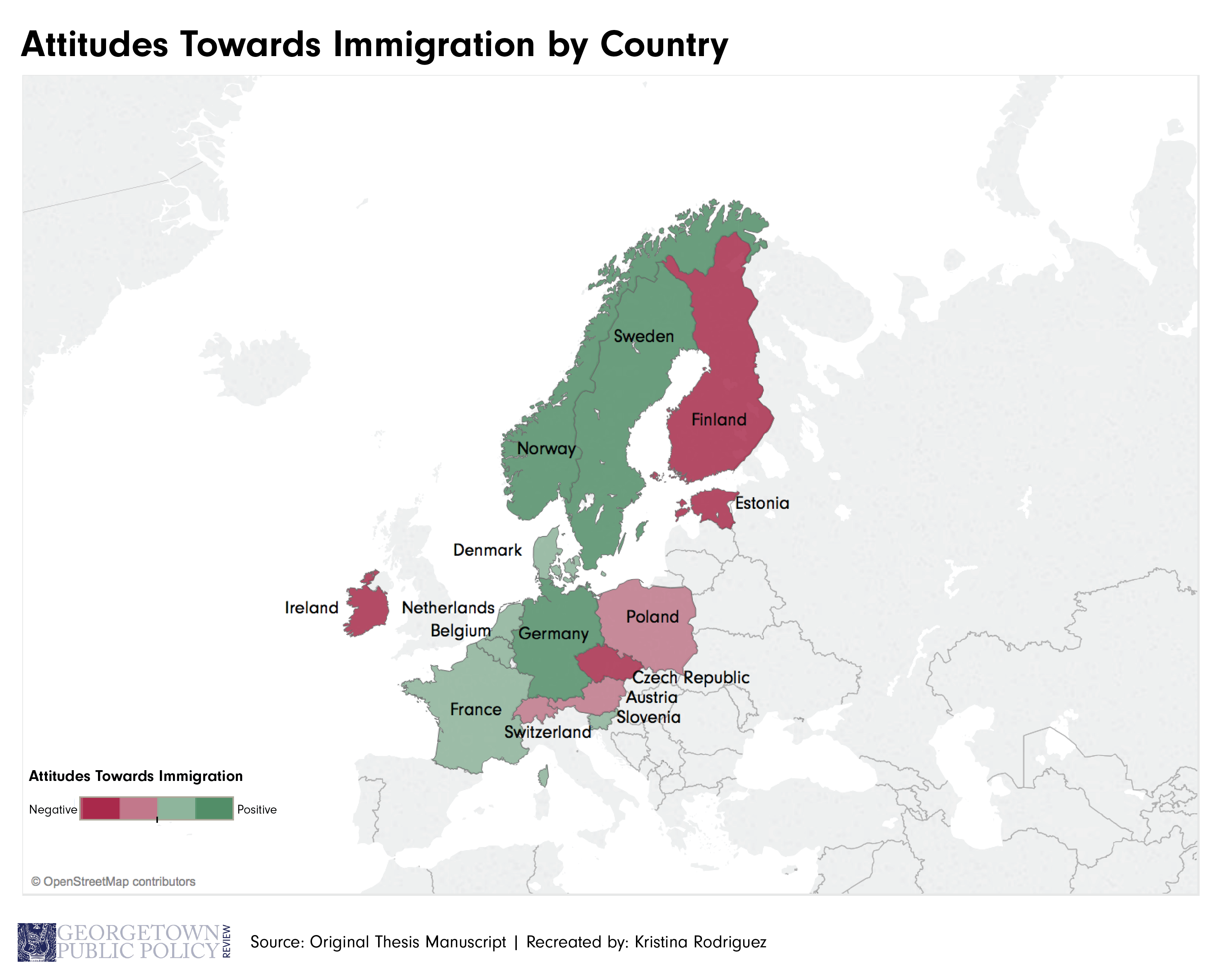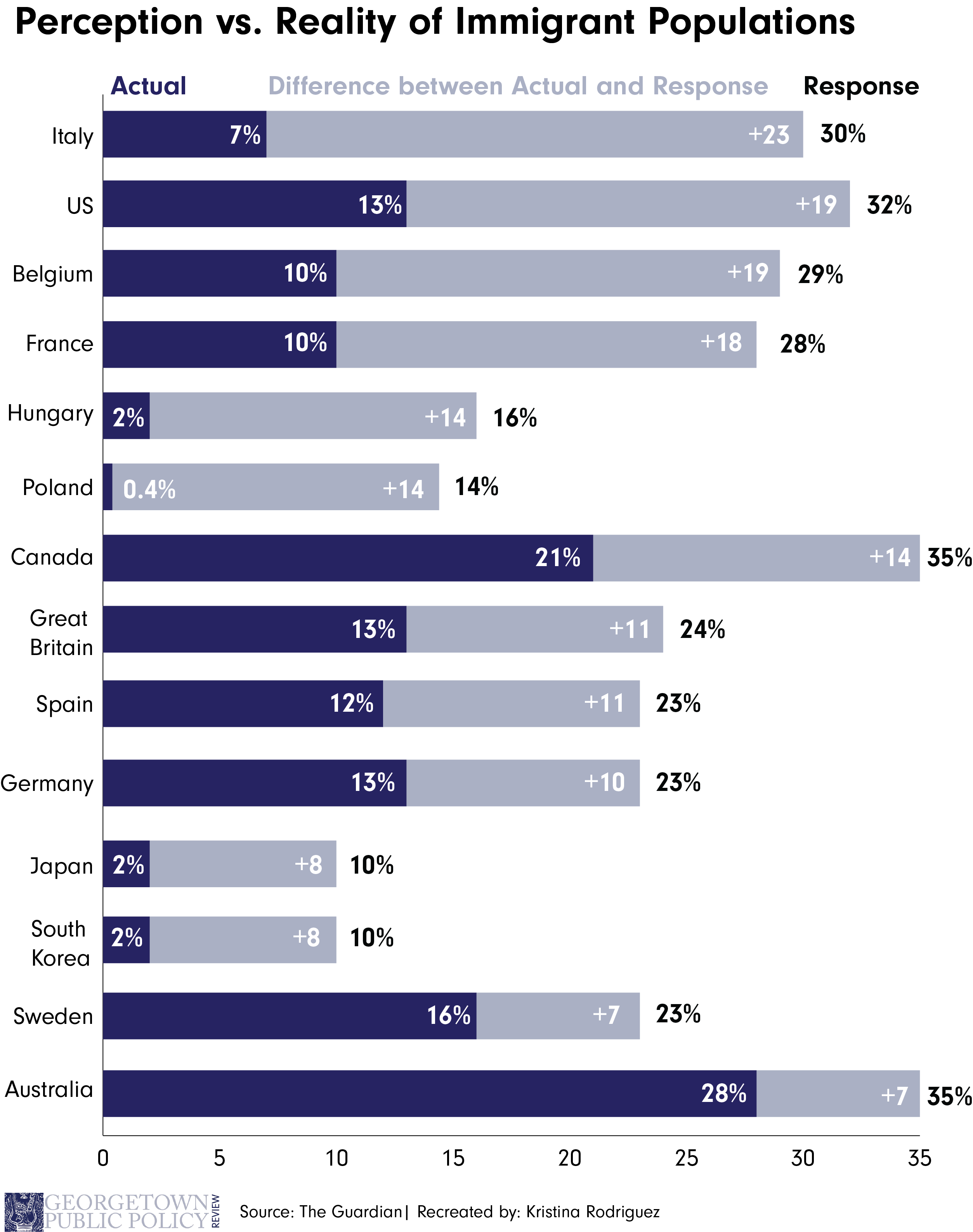Introduction
The Syrian refugee crisis has affected Europe more than any other refugee crisis since the Second World War. Reports place the total number of asylum claims in Europe at 1,321,560 during 2015, with Germany alone receiving more than a million migrants. The vast influx of immigrants, in addition to recent terror attacks across Europe, have fostered increasing backlash and resentment towards non-European immigration. A recent survey suggests that a significant portion of European citizens believe that accepting refugees into their countries will lead to increased terrorism and fewer jobs. These trends have coincided with rising popularity of populist and right wing parties across the continent, the majority of whom run on fervently anti-immigrant political platforms. In addition, the European Union (EU) has been struggling with tepid economic growth following the most recent recession and political fallout from the Greek debt crisis.

Given these inherently dissonant trends—Europe’s increasingly anti-migrant politics, slow economic growth, and its unprecedented migration crisis—it is critical to understand drivers of European citizens’ attitudes towards immigrants. Are these trends related? Why do people accept or reject immigrants? And what factors influence individuals’ tolerance for immigrants? My research set out to address one aspect of this complicated set of questions by looking at the relationship between peoples’ perceived financial security, and their likelihood of accepting or rejecting immigrants and minorities.
Background
Previous research has shown that perceptions can shape people’s worldviews as much as facts. A study by Ispos MORI reveals a significant gap between how the public perceives immigration statistics, and the actual immigration statistics in their countries. In this study, respondents were asked to estimate the average number of immigrants in their country. As demonstrated below, respondents often guessed double or even triple the actual number of immigrants.

This could have significant political implications. A 2015 study found that people are more likely to vote for right-wing parties based on their perceptions of how many immigrants resided in their countries of residence–rather than in the actual number of immigrants within their countries. This is especially notable given people’s perceptions are often wrong. In addition to miscalculating immigration numbers, as mentioned above, research demonstrates that people tend to view themselves as better than the average person on almost every measure, including socioeconomically.
While all of these studies measure different factors, there is a common unifying theme – perceptions matter, so much that they can significantly shape a person’s political behavior. Given the demonstrated importance of people’s perceptions, my research asks: is there a relationship between how secure people feel financially and their views on immigrants and minorities?
Methodology
To answer this question I draw upon the 2014 European Social Survey (ESS) dataset, the seventh round of a cross-country survey done on a biannual basis in Europe since 2001. The countries included are Austria, Belgium, Czech Republic, Denmark, Estonia, Finland, France, Germany, Ireland, Netherlands, Norway, Poland, Slovenia, Sweden, and Switzerland – providing a diverse sample of European nations.
I used this data to ask: is there a link between a person’s willingness to accept immigrants, and that person’s level of comfort with his or her current income, with current incomes self-assessed as “living comfortably,” “coping,” “difficult,” or “very difficult.” I also use comfort in income to run additional tests to ask if it affects people’s views on allowing minority groups into the country, namely Gypsies, Jews, and Muslims.
Findings of Comfort in Income towards accepting immigrants
Are Europeans who have less confidence in their household income are more likely to reject immigrants? My findings show strong evidence this is true. I found that a respondent’s comfort in his or her household income influences his or her attitudes towards immigrants. An individual’s confidence in their household income was also correlated with their attitudes towards immigrants. Respondents who stated that they were struggling to cope with their current household income were far more likely to reject immigrants. And while certain countries were on average more tolerant towards immigration, this relationship was observed across all surveyed European countries. In addition, respondents who were older, born locally, and more right-leaning politically were more likely to reject immigration.
Conversely, respondents who were more comfortable in their household income were found to be more welcoming towards immigrants. Education was also found to be a significant factor, as those with higher levels of education were also less likely to reject immigrants.
Findings of Comfort in Income towards accepting minority groups
Additional tests using the same data found that respondents who were less comfortable with their household incomes were also more likely to reject Muslims, Jews, Gypsies, and members of the LGBT community in their own societies. These relationships proved stronger in former Eastern bloc countries of the survey, which include the Czech Republic, Estonia, Poland, and Slovenia. Possible explanations for this phenomenon might be that Eastern European nations have experienced less immigration or their economies are less robust on average than their Western counterparts’. Countries with unemployment rates over 7.5 percent were also more likely to reflect this relationship.
Therefore, a person’s comfort with his or her income can play a key role in determining his or her attitudes towards others, regarding matters of ethnicity, nationality, religious denomination, and sexual orientation. Consequently, governments should consider individual level economic concerns when crafting policy to promote integration.
Conclusion
As lawmakers at the national and European Union level seek solutions to the large numbers of immigrants, it is valuable to understand citizens’ perceptions, and the drivers of citizens’ attitudes towards immigration to help promote integration between locals and migrants. Policymakers should be wary of relying exclusively on economic data, because individuals’ attitudes are shaped by their perceived—not just actual— economic status. My findings show that when people feel poorer, they are less welcoming not only to immigrants, but native minority groups as well.
Case Boeshaar is a McCourt School Graduate from the class of 2016 at Georgetown University. He currently works as an Assistant Program Officer for Middle East programs at the National Endowment for Democracy.
